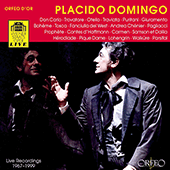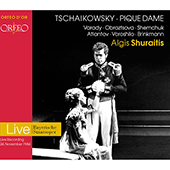Elena Obraztsova
Following war-time evacuation to the small town of Ustjuzhnu from 1942 to 1945, Obraztsova returned to her home city of Leningrad. Here, between 1948 and 1954, she sang gipsy romances and popular songs with a children’s chorus led by Maria Fedorovna Zarinskaya, a major influence. Obraztsova’s family then relocated in 1954 to Taganrog, where she studied singing with Anna Timofeevna Kulikova at that town’s Tchaikovsky Music School and was heard by M.A. Mankovskaja, upon whose recommendation she was accepted by the Rostov Music Academy. After a year there she moved in 1958 to the preparatory section of the Leningrad Conservatory before being accepted for study at the Conservatory itself.
In 1962 Obraztsova won two gold medals: at the World Youth Festival in Helsinki and at the All-Union Singing Competition in Moscow. She was immediately offered three parts for the 1963– 1964 season at the Bolshoi Opera in Moscow: Marina / Boris Godunov (in which she made her formal Bolshoi debut in December 1963), Polina / The Queen of Spades and Amneris / Aida. These were followed by Maria Dmitrievna Akhrosimova in Prokofiev’s War and Peace, while other roles with the Bolshoi company included Dalila / Samson et Dalila, Konchakovna / Prince Igor, Lyubasha / The Tsar’s Bride, Hélène / War and Peace and Oberon in Britten’s A Midsummer Night’s Dream at its Moscow premiere in 1965. Meanwhile in 1964 she had graduated from A.A. Grigorieva’s class at the Leningrad Conservatory with top marks.
Having made her debut at La Scala, Milan at the end of 1964 with the Bolshoi company as Marfa / Khovanshchina, Obraztsova appeared with the Bolshoi again at Expo 67, Montreal, and at the Metropolitan Opera in 1975, stopping the show in Boris Godunov at the end of Marina’s love duet with the false Dmitri, sung by Vladimir Atlantov. Her formal debut at the Met came in 1976, as Amneris; while later roles here included Dalila (1977); Charlotte / Werther and the title role in Carmen (both 1978); Adalgisa / Norma (1979); Azucena / Il trovatore (1987); Ulrica / Un ballo in maschera (1990); Grandma in Prokofiev’s The Gambler (2001); and Maria Dmitrievna Akhrosimova in a co-production of War and Peace mounted in 2002 with the Mariinsky Theatre, St Petersburg.
Obraztsova appeared at the Wiesbaden Festival in 1973 and in 1975 sang Azucena with the San Francisco Opera in a cast that included Joan Sutherland and Luciano Pavarotti. She returned to San Francisco in 1977 as the Princesse de Bouillon in Cilea’s Adriana Lecouvreur. In 1978 she created a sensation as Eboli in Don Carlos at La Scala, conducted by Abbado, and in 1981 first appeared at the Royal Opera House, London as Azucena, a role she repeated there in 1985.
Later operatic appearances took in Verona, the Ravenna Festival (Santuzza / Cavalleria rusticana, 1985), the Teatro Colón, Buenos Aires (Amneris, 1989) and San Francisco once again (the Principessa / Suor Angelica) (1990 – a role Obraztsova also sang in Venice in 1998), Washington (Prince Orlofsky / Die Fledermaus, 2003–2004) and Tokyo (Marquise de Birkenfeld / La Fille du Régiment, 2006).
In addition to performing in opera, Obraztsova appeared widely on the concert platform. While maintaining a strong presence in her native Russia, she also sang in concert in Italy, France, England, Spain, Germany, Canada and Japan, showing a predilection for the German Romantic repertoire and for Spanish music. In 1986 she directed Werther at the Bolshoi Theatre in Moscow. She continued to be active in the promotion of opera in St Petersburg.
Obraztsova took the first prize in the International Tchaikovsky Competition of 1970, was made a People’s Artist of the USSR in 1973 and was awarded the Lenin Prize in 1976. One of the most significant mezzo-sopranos of her generation, she possessed a richly vibrant and expressive voice and cut a particularly striking figure on stage.
© Naxos Rights International Ltd. — David Patmore (A–Z of Singers, Naxos 8.558097-100).


















